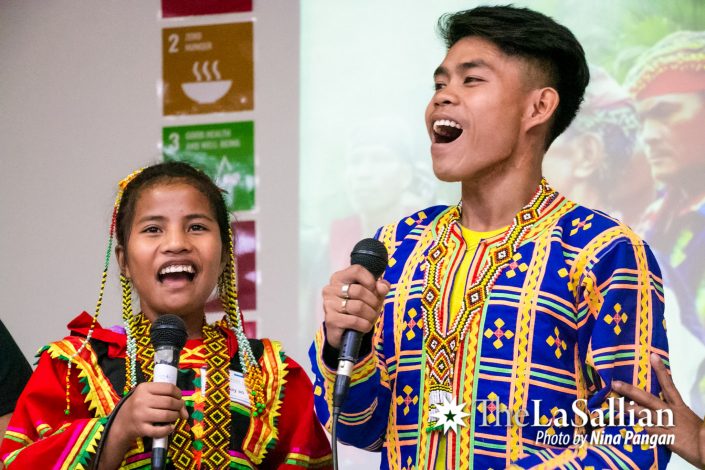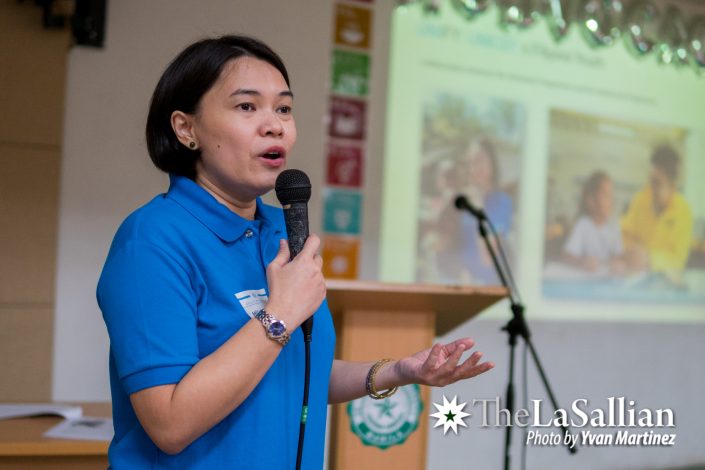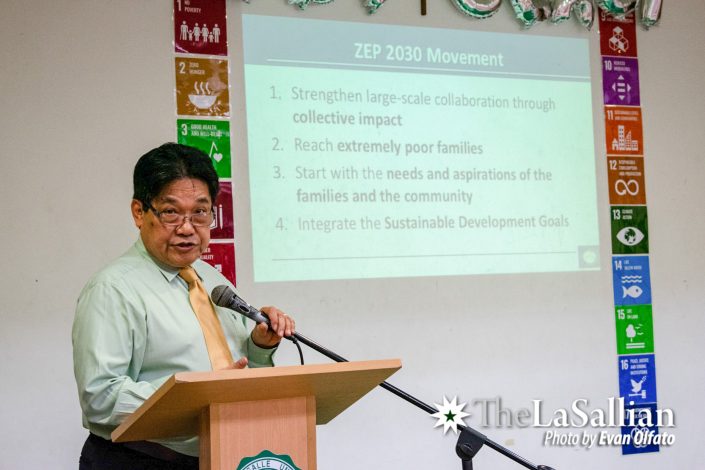Archers for UNICEF, a student organization aiding UNICEF Philippines’ efforts, recently hosted a four-part event entitled AUdvocacy to raise awareness on the United Nations’ Sustainable Development Goals (SDG). Running through the month of November, the program covered a series of topics which tackled sustainable goals such as Quality Education, Climate Action, and No Poverty.
In the eyes of the youth
Representatives from UNICEF shed light on the fundamental need of humanitarian support for children in the first session held last November 7.
Volunteer Program Manager (VPM) for UNICEF Milette Belen outlined UNICEF’s mission to promote the rights of every child on the planet without discrimination on the basis of race, religion, or gender.
As Belen explained, UNICEF PH’s advocacy plan includes an HIV Prevention Program, the Positive Parenting Program, and the Water, Sanitation, and Hygiene (WASH) Program, promoting sanitation and hygiene in local barangays. UNICEF’s flagship five-year Country Plan will involve several Philippine government agencies, which includes the Department of Health (DOH) and the Department of Social Welfare and Development (DSWD), as well as non-government organizations (NGOs).
“[The youth] are the emerging leaders of the country. You [the youth] have the passion to know and help the children,” she stated.
UNICEF Goodwill Ambassador Daphne Osena-Paez highlighted the crucial role of public personalities in the organization, and emphasized the need for increased awareness for breastfeeding and fighting malnutrition, recalling her experience in volunteer work in Maguindanao and Sarangani.
David Rhyan Ngo, a representative of the University of Santo Tomas (UST) Volunteers for UNICEF, discussed how the projects of UST Volunteers for UNICEF revolved around student participation for the goals of UNICEF, and expressed how it became an avenue for intellectual fulfillment.
“Sila (children) ang naging foundation or reason ko to stay [in UNICEF],” Ngo said, explaining his motivations as a student leader.
(They (the children) became my foundation or main reason to stay in UNICEF.)
For the greater good
The second installment of the series held last November 12 was dedicated to tackling Quality Education in the Philippines. Regina Pasion, a former Teacher Fellow for Teach for the Philippines (TFP) and Education and Human Development Specialist, shared her experiences as a public school teacher. After her resignation as a human resource worker, Pasion became an educator with the help of TFP.
Pasion related the harsh reality that students face, and being caught between the boundaries of a professional educator and an advocate. “You realize that they have a reality na ‘di mo alam, na hindi mo maiintindihan kasi ‘di ka taga-doon,” she explained.
(You realize that they have a reality that you don’t know and won’t understand because you are not from there.)
She shared that it was easy to turn a blind eye to these encounters, like most of her co-teachers do, but simply following a culture to maintain integrity was something Pasion could not live by.
“I think your advocacy, there would come a time where your idealism would hit reality and that would be the most important part of your advocacy because that would make or break who you are,” she stated.
Beverly Gofredo, Spokesperson of Liga ng mga Iskolar ng Bayan and Staff Member of Save Our Schools Network, shed light on the current situation of the Lumads. According to her, volunteer teachers have to integrate academic matters, health, and agriculture into their lesson plans. Lumad schools were built to provide education for indigenous tribes, where these people can eventually go back and help their communities.
“We study to go back to our communities and help, not to go somewhere else and have a better life there,” she said.
Of the 215 Lumad schools in Mindanao, 153 have been closed down, Gofredo added
Officers from the EDGE2018 batch government also presented their manifesto regarding the re-opening of 55 Lumad schools in Davao. Part of the manifesto’s call to action stated that the University Student Government will encourage the University to accommodate the Lumads for a minimum of two weeks and a maximum of a month.
Taking action
Climate Action was the focus of the third segment held last November 14. JunkNot! Founder Wilhelmina Garcia opined that the main issue for climate action is the lack of education toward environmental issues. Through the “power of design”, Garcia aimed to combine her love for art and passion for nature. One of her most well-known products is the UAAP Season 82 trophy.
On the other hand, Haydee Illenberger, a Public Engagement and Actions Manager of Greenpeace Southeast Asia Philippines,shared that her environmental consciousness started as a student.
“I was doing my share, I was bringing my own grocery bag, [and] and I was bringing my own containers when we do groceries,” she told the audience.
Illenberger lambasted society’s alleged false need for fossil fuels as one of the reasons why change remained stagnant. “We keep hearing it and we keep believing it. This narrative is created by corporations,” she claimed.

Power over poverty
The fourth and final installment last November 21 highlighted the SDG of diminishing poverty. Dr. Milton Amayun, President of International Care Ministries and a representative from the Bukluran para sa Pag-unlad ng Pamilya, opened the discussion by introducing the coalition of Zero Extreme Poverty Philippines, whose goal is to “conquer extreme poverty by 2030.”
“There are many Filipinos who survive [on] P90 per day for all their needs,” he said, highlighting the level of poverty in the country.
Amayun explained the plan of the initiative to strengthen large-scale collaboration through collective impact and reach extremely poor families, while integrating the 17 SDGs. At present, the coalition are already taking action in 350 local municipalities, with their goal being to reach 500.
“You [Lasallians] have a call to serve the less fortunate. Take up a degree that you can use to help the poor Filipinos,” Amayun encouraged the audience.
Wabel Animoza, Executive Assistant to the Managing Director of Young Focus for Education and Development Foundation Inc., highlighted the importance of a supportive family in pursuing education, which many Tondo children, she said, do not experience. “We want the children and families to see the significance of education. As we empower the children, we empower their families,” she stated further.
Jessica Salinas of U! Happy, an organization dedicated to bridging the gap between benefactors and marginalized children, touched on the issue regarding the consistent number of children living below the poverty line in the country. “There are three in every 10 children who belong to poor families,” Salinas added.
Closing the four-part series, Salinas reminded the audience, “If we do small actions, the collective reward will be something rewarding.”
With reports from Kim Balasabas and Ian Kevin Castro


